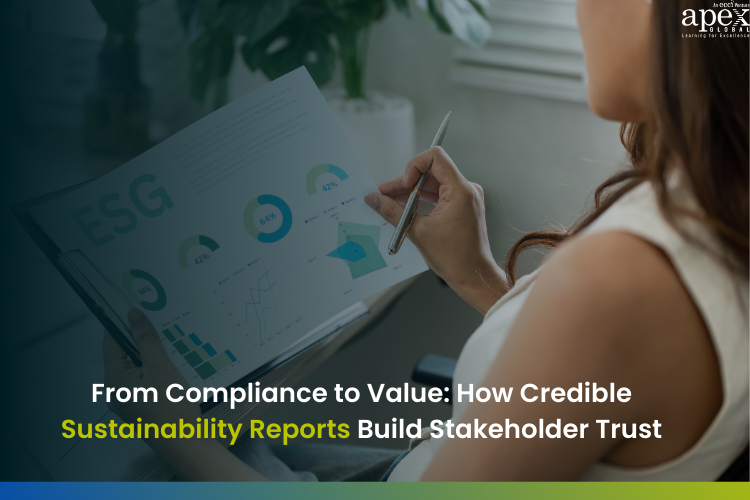A decade ago, sustainability reporting in the Philippines often looked like a glossy brochure filled with cheerful images, a few corporate social responsibility (CSR) stories, and selected highlights of environmental efforts. While those reports looked good on paper, stakeholders have become more discerning. They now ask tougher questions: How reliable is this data? What are the risks? What are the measurable results?
Today, sustainability reporting is no longer optional. It is an important way to show an organisation’s integrity and to explain its plans for the future. For Filipino companies in a global marketplace, the challenge is to move beyond compliance and create reports that show real long-term value and build trust.
What you'll find in this article
- 1 Compliance: The Foundation, Not the Pinnacle
- 2 Beyond Compliance: Embedding Value in Reporting
- 3 The Cornerstone: Credibility
- 4 Trust as a Strategic Asset
- 5 The Art of Storytelling: From Numbers to Narratives
- 6 Obligation or Opportunity?
- 7 The Practitioner’s Role: Custodians of Trust
- 8 Conclusion: Building Trust in the Philippine Context
Compliance: The Foundation, Not the Pinnacle
Compliance remains the bedrock of sustainability reporting. Frameworks such as the Global Reporting Initiative (GRI) and the recently launched IFRS S1 and S2 standards provide a structured approach, ensuring reports are comparable and decision-useful.
In the Philippines, listed companies are increasingly urged to align with these international frameworks. The Philippine Stock Exchange (PSE) has already set guidelines on sustainability reporting, and regulators are nudging firms to strengthen transparency. Compliance demonstrates that organisations:
- Meet baseline expectations of regulators, investors, and the public.
- Mitigate risks by ensuring disclosures are standardised and defensible.
- Position themselves globally, aligning with best practices recognised by international stakeholders.
However, compliance is only the first stage. It ensures organisations meet requirements but does not create real impact. Reports that focus only on meeting rules often remain technical and limited. They provide information but do not communicate a clear strategy for long-term value.
Beyond Compliance: Embedding Value in Reporting
Value-driven reporting is about turning sustainability disclosures into strategic narratives that highlight purpose and progress. Filipino organisations that move beyond compliance are able to demonstrate not only what they have done but also why it matters.
Such reports:
- Reveal both strengths and shortcomings, signalling accountability.
- Show how sustainability goals link to business growth and long-term resilience.
- Offer decision-useful insights that investors can act upon.
- Strengthen customer and community trust by being transparent about impacts.
- Inspire employees by proving their daily work contributes to a larger cause.
The difference is striking: compliance-driven reports focus mainly on meeting requirements, while value-driven reports provide a clearer picture of progress, direction, and purpose.
The Cornerstone: Credibility
In recent years, cases of greenwashing have raised concerns, making credibility the most important factor in sustainability reporting. Without credibility, even well-presented reports lose their value.
Credibility in reporting is built on four pillars:
- Accuracy – Verified, transparent data, often subjected to independent assurance.
- Consistency – Comparable disclosures over time that reveal true progress.
- Relevance – A sharp focus on material issues such as climate resilience, supply chain responsibility, or community impact.
- Balance – Acknowledging challenges alongside achievements.
Stakeholders often trust imperfection more than perfection. A Philippine company admitting it is still struggling with reducing carbon emissions, but outlining its plan to improve, gains more respect than one claiming flawless performance with no evidence.
Trust as a Strategic Asset
Trust cannot be shown in financial statements, but it plays a critical role in business success. Sustainability reports that are accurate and credible help companies earn this trust and strengthen relationships with stakeholders.
- Investors gain confidence in allocating capital, knowing decisions are backed by credible ESG data.
- Employees feel motivated when they see their contributions reflected in tangible sustainability progress.
- Customers gravitate towards brands whose actions align with their values.
- Communities trust companies that back promises with measurable outcomes, particularly in areas such as renewable energy, disaster preparedness, and social development.
In a country like the Philippines where communities face acute climate risks such as typhoons, flooding, and rising sea levels, credible reporting is not just about corporate reputation; it is about demonstrating genuine responsibility.
The Art of Storytelling: From Numbers to Narratives
While metrics provide the skeleton of a report, stories breathe life into it. A figure that says “10,000 trees planted” becomes far more meaningful when told alongside the story of a reforestation project in Mindanao that restored livelihoods for local farmers.
Numbers appeal to reason, but stories appeal to emotion. The most effective sustainability reports blend both, ensuring that they speak to the head and the heart of stakeholders. For Filipino companies, this balance is vital, especially in a society where trust and relationships carry immense cultural weight.
Obligation or Opportunity?
Sustainability reporting was once seen only as an administrative task, but it has now become a strategic opportunity. For Filipino businesses, it can drive innovation, strengthen competitiveness, and improve resilience.
By treating sustainability reports as more than compliance documents, companies can:
- Differentiate themselves in a crowded marketplace.
- Win investor confidence by showcasing transparency and accountability.
- Future-proof operations by embedding sustainability into the core business model.
- Strengthen global competitiveness as investors increasingly demand ESG disclosures aligned with international standards.
What was once only a requirement is now an important tool for business growth and long-term success.
The Practitioner’s Role: Custodians of Trust
Sustainability reports are prepared by professionals who make sure the information is correct, clear, and useful. They follow the rules, understand new regulations, and make reports that are not only accurate but also helpful for company strategy.
In the Philippines, as regulators and the stock exchange ask for stronger sustainability practices, the need for these professionals will grow. Their job will not just be about compliance. They will also be responsible for making companies trustworthy and reliable to stakeholders.
Conclusion: Building Trust in the Philippine Context
For Filipino companies, the shift from compliance to value is no longer optional, it is essential. Compliance may keep regulators satisfied, but it is credible, value-driven reporting that wins the hearts of stakeholders, strengthens resilience, and secures long-term growth.
Sustainability reports are not just about meeting requirements; they are about earning trust. And in a country as vulnerable to climate change as the Philippines, trust is not just desirable it is indispensable.
For professionals eager to lead this transformation, the right knowledge and tools are crucial. The Sustainability Reporting Practitioner programme equips practitioners with globally recognised frameworks, practical insights, and the confidence to move beyond compliance and craft credible, value-driven reports. In doing so, they help their organisations not only tell better stories but also build a future anchored in trust.

